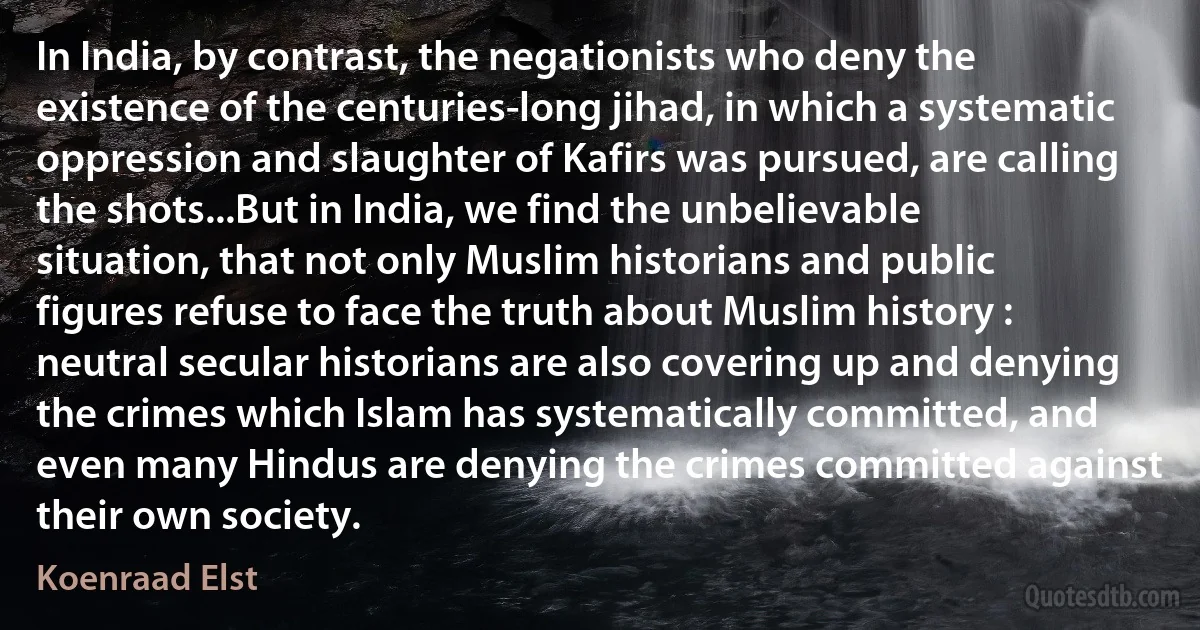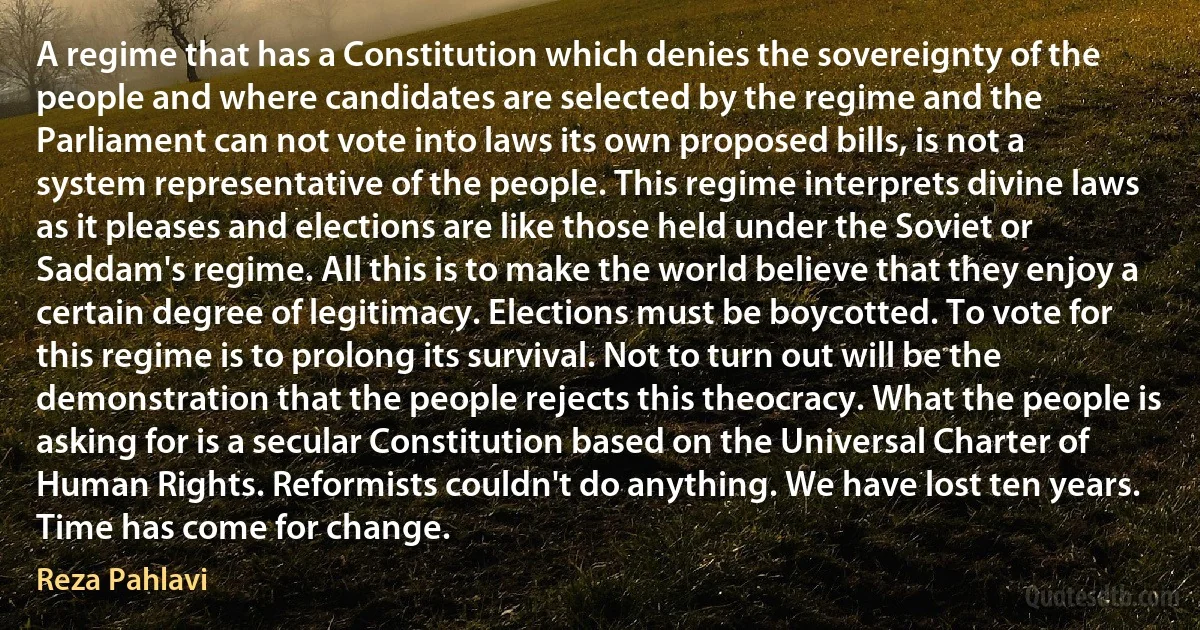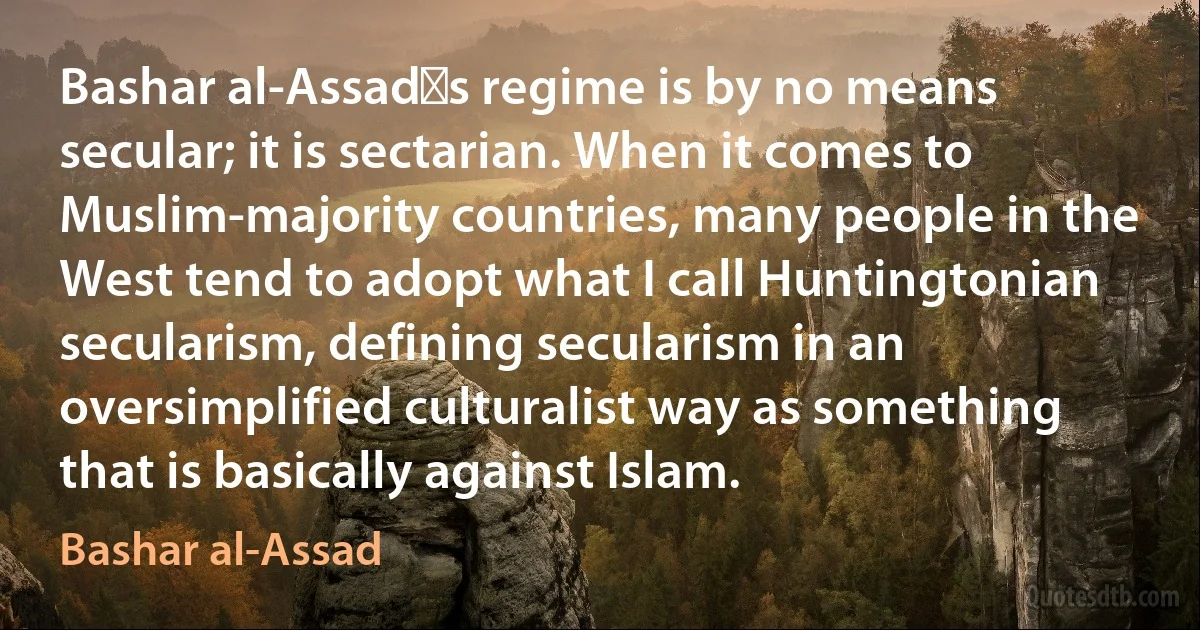Secular Quotes - page 16
For a "less than patriotic record”, Mr. Khan may look to the Muslim League, which firmly collaborated with the British and received the overwhelming majority of the Muslim votes in the 1945-46 elections on the single-point programme of rejecting the secular state in favour of Islamic separatism. Chapter 10. Let's combat communalism.

Koenraad Elst
This way, Godse (born 1910) exacted ‘punishment' for Gandhi's alleged pro-Muslim policies. These were particularly his acceptance in June 1947 of the plan to partition India into a secular state, retaining the name India and a Muslim state called Pakistan; and more immediately his fast, earlier in January 1948, on behalf of the safety of the Delhi Muslims threatened by angry Hindu refugees pouring in from Pakistan, and in support of Pakistan's demand that India pay them ₹550 million as their share from the treasury of British India. Under protest, the Indian Government had given in to the latter demand because of Gandhi's pressure, and in spite of the presence of Pakistani invasion troops on Indian territory in Kashmir. Surely this was the first time in history that a country deliberately financed its battlefield opponent, and not everyone was pleased with this display of Gandhian values.

Koenraad Elst
I guess that both the West and the world are getting to turn away from man - worshipping ideologies - Communism and secular individualism alike - and become converted to an Oriental religion corning neither from Russia nor from the West. I guess that this will be the Christian religion that came to the Greeks and the Romans from Palestine, with one or two elements in traditional Christianity discarded and replaced by a new element from India, I expect and hope that this avatar of Christianity will include the vision of God as being Love. But I also expect and hope that it will discard the other traditional Christian vIsion of God as being a jealous god, and that it will reject the self-glorification of this jealous god's "chosen people" as being unique. This is where India comes in, with her belief that there may be more than one illuminating and saving approach to the mystery of the universe.

Arnold J. Toynbee
At present the fashion appears to have set in in favour of two very distinct styles. One is a very impure and bastard Italian, which is used in most large secular buildings; and the other is a variety of the architecture of the thirteenth century, often, I am sorry to say, not much purer than its rival, especially in the domestic examples, although its use is principally confined to ecclesiastical edifices. It is needless to say that the details of these two styles are as different from each other as light from darkness, but still we are expected to master both of them. But it is most sincerely to be hoped that in course of time one or both of them will disappear, and that we may get something of our own of which we need not be ashamed. This may, perhaps, take place in the twentieth century, it certainly, as far as I can see, will not occur in the nineteenth.

William Burges
Three cartoons made political points.
One showed Muhammad turning away suicide bombers from the gates of heaven, saying "Stop, stop - we ran out of virgins!" - which I believe was a commentary on Muslims' predilection for violence. Another was a cartoon of Muhammad with horns, which I believe was a commentary on Muslims' predilection for violence. The third showed Muhammad with a turban in the shape of a bomb, which I believe was an expression of post-industrial ennui in a secular - oops, no, wait: It was more of a commentary on Muslims' predilection for violence.
In order to express their displeasure with the idea that Muslims are violent, thousands of Muslims around the world engaged in rioting, arson, mob savagery, flag-burning, murder and mayhem, among other peaceful acts of nonviolence.
Muslims are the only people who make feminists seem laid-back.

Ann Coulter
His conflict with the Catholic Church arose because deep in his heart Galileo was a believer. There was for him no path of compromise, no way to have separate secular and theological cosmologies. If the Copernican system was true as he believed, what else could Galileo do but fight with every weapon he had in his arsenal... to make his Church accept a new system of the universe. ...In the contrast between Galileo's heroic stand when he tried to reform the cosmological basis of orthodox theology and his humbled, kneeling surrender when he disavowed his Copernicanism, we may sense the tremendous forces attendant on the birth of modern science.

Galileo Galilei
The centre of the town was swathed in red flags. It was my first demonstration and one that I remember to this day. The city was Lahore, which for many centuries had been a much envied metropolis in Northern India. Then the last conquerors had departed, leaving behind a divided subcontinent. The old town had become part of a new country – Pakistan. The founder of this state, Mohammed Ali Jinnah, an agnostic, had cynically used religion to create a ‘Muslim nation'. Jinnah had expressed the hope that Pakistan would, despite everything, remain a secular state, but the logic of history had proved fatal. All the Hindu and Sikh families in Lahore had fled across confessional frontiers. Little ‘Lahores' had sprung up in Delhi.

Tariq Ali
Marx's ideas became the doctrines inspiring the labour and socialist movements of most of Europe. Mainly via Lenin and the Russian Revolution they became the quintessential international doctrine of twentieth-century social revolution, equally welcomes as such from China to Peru. Through the triumph of parties identified with these doctrines, versions of these ideas became the official ideology of the states in which, at their peak, something like a third of the human race lived, not to mention political movements of varying size an importance in the rest of the world. The only individually identifiable thinkers who have achieved comparable status are the founders of the great religions in the past, and with the possible exception of Muhammad none have triumphed on a comparable scale with such rapidity. No secular thinker can be named beside him in this respect.

Eric Hobsbawm
In the interests of refuting such chaotic concepts as those which see a divine Church only in a "Church of the saints", an entirely invisible society which is nothing but a pure abstraction, we must not fall into the contrary error. The Church "in so far as visible" is also an abstraction, and our faith should never make separate what God from the beginning has joined together: [...] in ecclesiology just as [...] in Christology, [...] dissociation of the divine and the human [...] is fatal. If necessary, the experience of Protestantism should serve us as sufficient warning. Having stripped it of all its mystical attributes, it acknowledged in the visible Church a mere secular institution; as a matter of course it abandoned it to the patronage of the state and sought a refuge for the spiritual life in an invisible Church, its concept of which had evaporated into an abstract ideal.

Henri de Lubac
When reading the story of Yeshu one is reminded of another Jew who, like Yeshu, became one of the most influential people in all of history but was also condemned and rejected by the Jews – Baruch Spinoza of Amsterdam (1632-1677). He, too, had been fully part of the Jewish community, then started to oppose Judaism, broke away at a young age and became one of the greatest secular Jewish philosophers ever. He, too, is admired by millions.

Baruch Spinoza
The only successful attempt to free human reason from the authority of religion was that of Spinoza (1632–1677). In his Theologico-Political Treatise (1670) he denied the claims for divine authority based on the text of Scripture and religious tradition. [...] Spinoza was the first secular Jew, and as such, the first secular man. Indeed, he served as the role model for all secular Jews, instituting the precise features that characterized future Jewish secularists.

Baruch Spinoza
Spinozism is a last-ditch salvationist movement, aimed at redeeming the status of isms. It stands for ‘ismhood', a necessarily total secular faith fusing conceptual satisfaction and moral-political guidance. The aim is redemption, guaranteeing the future of the intelligentsia in this postmodern, and post-everything sense. Entrancing the globe by multitude-speak, the role of intellectuals is to fuse the coat of many colours into a consummate internationalism. And what can the warp and woof of this fabric be, but politically correct love?

Baruch Spinoza
...To the extent that we are committed to the ideal of a secular society free of ecclesiastic influence and governed by toleration, liberty, and a conception of civic virtue; and insofar as we think of true religious piety as consisting in treating other human beings with dignity and respect, and regard the Bible simply as a profound work of human literature with a universal moral message, we are the heirs of Spinoza's scandalous treatise [Tractatus Theologico-Politicus].

Baruch Spinoza
The political ideal that Spinoza promotes in the Theological-Political Treatise is a secular, democratic commonwealth, one that is free from meddling by ecclesiastics. Spinoza is one of history's most eloquent advocates for freedom and toleration. The ultimate goal of the Treatise is enshrined in both the book's subtitle and in the argument of its final chapter: to show that ‘freedom to philosophise may not only be allowed without danger to piety and the stability of the republic, but that it cannot be refused without destroying the peace of the republic and piety itself'.

Baruch Spinoza
According to the seventeenth-century way of thinking, an atheist was by definition a decadent. If there was no God (or, at least, no providential, rewarding-and-punishing God of the sort worshipped in all the traditional religions), the reasoning went, then everything is permitted. So a non-beliver would be expected to indulge in all manner of sensual stimulation... to lie, cheat, and steal...
Spinoza, according to all seventeenth-century interpreters, rejected all the traditional ideas about God; he was indesputably a heretic. Yet his manner of living was humble and apparently free of vice. Then, as now, the philosopher seemed a living oxymoron: he was an ascetic sensualist, a spiritual materialist, a sociable hermit, a secular saint. How could his life have been so good, the critics asked, when his philosophy was so bad?

Baruch Spinoza
The head of Christians does not, as a rule, have power to punish secular wrongs with a capital penalty and other bodily penalties and it is for thus punishing such wrongs that temporal power and riches are chiefly necessary; such punishment is granted chiefly to the secular power. The pope therefore, can, as a rule, correct wrongdoers only with a spiritual penalty. It is not, therefore, necessary that he should excel in temporal power or abound in temporal riches, but it is enough that Christians should willingly obey him.

William of Ockham
The vast majority of American children have been educated in the American public school system, in which textbooks and courses of instruction are increasingly oriented to reflect humanist views and a secular philosophy. The undermining of respect for parental authority in favor of state direction or individual autonomy, and the contemporaneous purging of religious influence in the public schools has impaired the development of healthy family members. Values that had historically provided strength to the family, such as firm discipline and corporal punishment, patriotism, and academic achievement, were either attacked, or given token attention.

Bob McDonnell
In the beginning was the Word. The Word was with God, signified God's Word, the word that was Creation. But over the centuries of human culture the word has taken on other meanings, secular as well as religious. To have the word has come to be synonymous with ultimate authority, with prestige, with awesome, sometimes dangerous persuation, to have Prime Time, a TV talk show, to have the gift of the gab as well as that of speaking in tongues. The word flies through space, it is bounced from satellites, now nearer than it has ever been to the heaven from which it was believed to have come.

Nadine Gordimer
Aurangzeb's orthodoxy cannot, of course, be entirely denied. Therefore, explanations upon explanations – secular explanations! – are invented...The general conclusion: what Aurangzeb did ‘was a setback to the policy of broad toleration followed by his predecessors'! And even he did it for secular reasons! And even though compelled by these reasons, he did it only for the shortest time, for the years marked by hostilities instigated by ‘local elements'! ... However, there is little mystery. For there are two pillars of progressive history writing in India: first, to fabricate evidence which will establish Hindus to be intolerant; second, to respect and show an empathetic understanding of Islamic communalism. And the litmus test of whether you are committed to secular history writing is whether you are prepared to stand up for Aurangzeb!

Aurangzeb
I would smile quietly while these young men cheered him on and hear-hear'd. Just wait, I'd think, knowing the moment would arrive when the ideological fiddler would have to be paid, when the host would change the topic and the earnest and happy young men would be reduced to looking at their shoes and muttering Oh, well, yes, I suppose. I like to think of this as the Mother Teresa Moment, named for Hitch's most incendiary cultural dissent but applicable to any subject that might startle the Christian soldiers of the Bush administration into remembering that, apart from Saddam Hussein, Hitch remained entirely his unreconstructed secular and socialist self.

Christopher Hitchens



